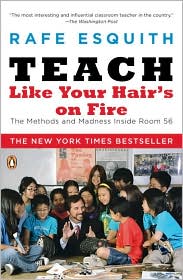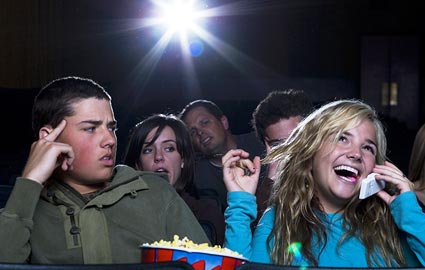 Last summer, I accepted a new position at High Trails as Program Coordinator. At the time, I was unclear exactly what that meant.
Last summer, I accepted a new position at High Trails as Program Coordinator. At the time, I was unclear exactly what that meant.
Honestly, as we moved forward in the school year, I was still unsure as to what my job description was.
It was a new position which stemmed from the Program Director position, but was split between two people. As my male counterpart Dan and I struggled to define what our goals were to be during the school year, our ever-intelligent boss suggested that we take some time to find inspiration.
 Inspiration within the teaching field is sometimes hard to find. We talked to a school teacher we both knew, and she had a suggestions for us; look for inspiration in a book. One book in particular, written by a Los Angeles school teacher named Rafe Esquith. You may have heard of him. Just a few of his honors include the 1992 Disney National Outstanding Teacher of the Year Award, A Sigma Beta Delta Fellowship from Johns Hopkins University, Oprah Winfrey’s “Use Your Life Award”, and was made an honorary Member of the Order of the British Empire. If you would like to read one of his New York Times Bestsellers, check out There Are No Shortcuts or Lighting Their Fires.
Inspiration within the teaching field is sometimes hard to find. We talked to a school teacher we both knew, and she had a suggestions for us; look for inspiration in a book. One book in particular, written by a Los Angeles school teacher named Rafe Esquith. You may have heard of him. Just a few of his honors include the 1992 Disney National Outstanding Teacher of the Year Award, A Sigma Beta Delta Fellowship from Johns Hopkins University, Oprah Winfrey’s “Use Your Life Award”, and was made an honorary Member of the Order of the British Empire. If you would like to read one of his New York Times Bestsellers, check out There Are No Shortcuts or Lighting Their Fires.
 This man speaks of truths which should be implemented within each classroom.
This man speaks of truths which should be implemented within each classroom.
For example, the simple aspect of replacing trust among your students, rather than fear, is paramount to establishing a working system within your class.
Esquith also devotes a chapter of his book Teach Like Your Hair’s on Fire to Lawrence Kohlberg’s Six Levels of Moral Development. As my reading began, I felt that this concept transcends not only every aspect of teaching, but also your everyday involvement with other human beings. These levels are so beautifully simple, yet require a lifetime of work to accomplish. Please read on for a brief summary of Kohlberg’s Six Levels.

Level 1. I don’t want to get in trouble.
Students often learn as soon as they enter the world what behaviors will receive a punishment, and what will not. Their main motivations of doing their homework, staying quiet, or doing what they are told stem from the desire to stay out of trouble.
Why do we work? Is it for the money, or the enjoyment of contributing to society? Why do students complete their homework? Is it for the gold star or pat on the back for a job well done?

Maybe it’s because they realize that the concept will apply to their life. During this stage of development, humans ask “What’s in this for me?” As Equith states, “teachers are especially guilty of enforcing” Level 2 thinking. “We have learned that if children are rewarded for good behavior, they are more likely to repeat behavior we deem acceptable.”
 Level 3. I want to please somebody.
Level 3. I want to please somebody.
As children grow up, they begin to look for ways to please those around them. From their parents, to their teachers, to their friends, they look up to them and ask “Look at this! Is it good?” Why don’t we ask our children, “What do you think?” This is also the stage in which social norms become important. The “good girl” and “good boy” complex begins to hold more weight and children’s rewarded behavior changes accordingly.
Level 4. I follow the rules.
 Law and order are important during this stage of development. As teachers, we begin the week, or the school year by laying down the rules and threatening students to follow those rules. Sometimes there is an explanation for why those rules are important. But, more often than not, we expect our students to follow the rules, solely for the reason that we are supposed to follow the rules for rules’ sake. However, the more invested your students are in creating the “laws of the classroom,” the more apt they will be to follow.
Law and order are important during this stage of development. As teachers, we begin the week, or the school year by laying down the rules and threatening students to follow those rules. Sometimes there is an explanation for why those rules are important. But, more often than not, we expect our students to follow the rules, solely for the reason that we are supposed to follow the rules for rules’ sake. However, the more invested your students are in creating the “laws of the classroom,” the more apt they will be to follow.
Level 5. I am considerate of other people.
This stage is rare for both children and adults to reach. As Esquith states, “If we can help kids achieve a state of empathy for the people around them, we’ve accomplished a lot.” Think to the person who talks on his cell phone in a restaurant, or stands in the middle of the street looking at a map, blocking the way. Wouldn’t our world be a better place if we took those around us into consideration in how we treated one another?
Level 6. I have a personal code of behavior and I follow it OR the Universal Ethical Principles Stage.
 Esquith equates this level with Atticus Finch of To Kill a Mockingbird. Helping students (and adults!) develop their own moral code is important to their development as a person. This is the level people reach when something is done well, or a good deed is performed, but that person is not in need of external adoration or compliment. This level is when you do something because it is who you are. In a world full of catty characters on MTV, and glorified athletes on ESPN, we could all use the lessons taught by Atticus Finch.
Esquith equates this level with Atticus Finch of To Kill a Mockingbird. Helping students (and adults!) develop their own moral code is important to their development as a person. This is the level people reach when something is done well, or a good deed is performed, but that person is not in need of external adoration or compliment. This level is when you do something because it is who you are. In a world full of catty characters on MTV, and glorified athletes on ESPN, we could all use the lessons taught by Atticus Finch.
Now, looking back, I am so glad that Dan and I were introduced to Mr. Esquith, and that we were allowed the opportunity to gather ourselves to define what our goals were to be for the year. If you would like to hear a little wisdom from Rafe, click here.
 At High Trails Outdoor Science School, we literally force our instructors to write about elementary outdoor education, teaching outside, learning outside, our dirty classroom (the forest…gosh), environmental science, outdoor science, and all other tree hugging student and kid loving things that keep us engaged, passionate, driven, loving our job, digging our life, and spreading the word to anyone whose attention we can hold for long enough to actually make it through reading this entire sentence. Whew…. www.dirtyclassroom.com
At High Trails Outdoor Science School, we literally force our instructors to write about elementary outdoor education, teaching outside, learning outside, our dirty classroom (the forest…gosh), environmental science, outdoor science, and all other tree hugging student and kid loving things that keep us engaged, passionate, driven, loving our job, digging our life, and spreading the word to anyone whose attention we can hold for long enough to actually make it through reading this entire sentence. Whew…. www.dirtyclassroom.com


Comments are closed.